DANSE: A French-American Festival of Performance and Ideas opens with a work by Alain Buffard.
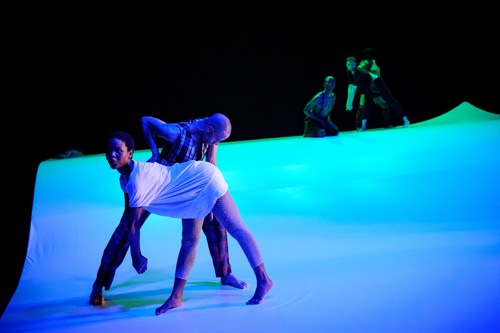
Dorothée Munyaneza and Will Rawls in Alain Buffard’s Baron Samedi, At back: David Thomson (L) and Olivier Normand. Photo: Ian Douglas
The French in America! I do not speak of the emigrating 17th-century Huguenots, or of Alexis de Tocqueville, who journeyed around the U.S. in the 19th-century and said wise things about it. Je ne parle pas de croissants, ni de boeuf bourgignon. Dior? Pouf! Bidets? They never caught on.
No, I refer to DANSE: A French-American Festival of Performance and Ideas that is happening at various venues around New York City from May 1 to May 18 and was organized by the Cultural Services of the French Embassy in the USA, with additional support from the Institut français, and Région Languedoc-Roussillon. (http://frenchculture.org/visual-and-performing-arts/festivals/danse-french-american-festival-performance-ideas) Inaugurated in 2012, the festival tests the boundaries of art and decorum, along with forging transatlantic and transnational collaborations.
This year’s festival honors the memory of choreographer Alain Buffard, who died in December of 2013 at the age of 53, so it is appropriate that it opened with his last work, the 2012 Baron Samedi. Buffard crossed French-American lines long ago, when he studied dance in France with the Americans Alwin Nikolais and Viola Farber. When he presented his Good Boy at Danspace St. Marks in 2003, the performers were mostly downtown New York dancers and choreographers, although his 2005 Les inconsolés, shownat Dance Theater Workshop in 2010, was a trio for three Frenchmen, including Buffard himself.
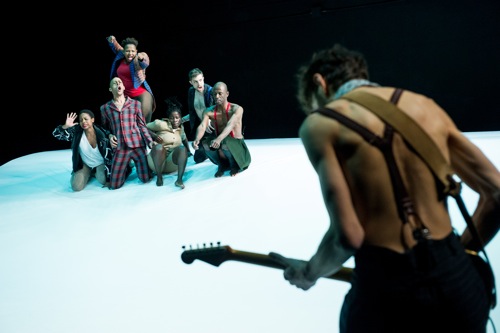
Foreground: Sébastien Martel. At back, L to R: Dorothée Munyaneza, Will Rawls, Hlengiwe Lushaba (standing), Nadia Beugré, Olivier Normand, David Thomson. Photo: Ian Douglas
Buffard’s 2008 video, My Lunch with Anna (a conversation with west-coast innovative force Anna Halprin), plays in the lobby of New York Live Arts, where Baron Samedi was performed May 1 through 3. Forget Franco-American relations. This piece is a veritable stew of languages, memories, traditions, and nationalities. Nadia Beugré, Hlengiwe Lushaba, and Dorothée Munyaneza began their careers in different African nations. Will Rawls and David Thomson are American born and educated (and familiar to adventurous dance-going New Yorkers). Olivier Normand, bass-player and composer Sarah Murcia, and guitarist Sébastien Martel are French.
All of these speak French, German, English, and more (once, Normand, a practitioner of capoeira, sings in Portuguese). All sing (most notably and frequently Lushaba). All dance (although what they do stretches the definition).
In 2006, I ended my review of Buffard’s Les inconsolés with this sentence: “This is the kind of dance that gives you nightmares, but while it’s happening, you daren’t look away.” The same is true of Baron Samedi. The more recent piece is also perplexing, disturbing, and sometimes funny. “What is going on?” you think more than once. But you can’t look away.
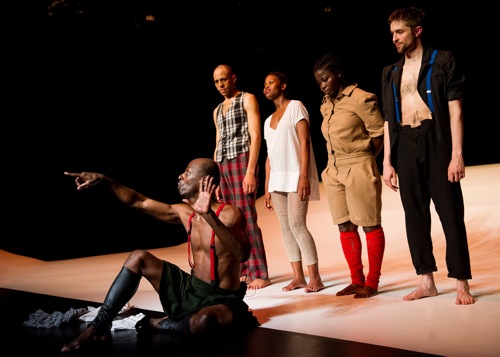
Alain Buffard’s Baron Samedi. David Thomson (seated), watched by (L to R) Will Rawls, Dorothée Munyaneza, Nadia Beugré and Olivier Normand. Photo: Ian Douglas
The program calls Baron Samedi a “choreographed opera,” and periodically one or the other of the extraordinary performers delivers a song by Berthold Brecht and Kurt Weill. These are raucous, sardonic ones, such as “Pirate Jenny” and “Mackie Messer” from The Threepenny Opera and “Ach bedenken Sie, Herr Jakob Schmidt” from The Rise and Fall of the City of Mahoganny. All the music, accompanied by Murcia and Martel, speak of love, loss, degradation, and fuck-you ambition. The presiding figure is Baron Samedi, a Loa of Haitian vodun. He reeks of greed and death and dissipation, but is somehow also associated with redemption. Thomson most often sports the top hat, jacket, and the arrogant, insinuating manners of the Baron, but the hat is passed around to cloak—temporarily—anyone with that authority. It is Thomson who sings “Pirate Jenny,” which he does in a strong, triumphant sneer of a tone (although the words are not always easy to understand).
The costumes by Nadia Lauro are rag-tag layers that are often shed or re-purposed. Her ingenious set resembles a large hill of white paper, one of whose corners is tilted up, as if it had been flipped by a wind and left in that position. The surface is covered with plastic sheeting, which renders it slippery and a bit spongy; cast members can slide or tumble down it and partly or completely disappear behind it.
Rarely does anyone leave the stage. Life is a game these people are playing—bargaining, conquering, cheating, and looking out for themselves in a dark, amoral world. The musicians are not immune to danger either, and at one point Murcia must play a keyboard wearing a little white pillow-case mask, as do the actor-singer-dancers (these have eye and mouth holes both back and front and make the huddled performers look like cats on an alley fence). That’s not the only bestial image. Beugré, early in Baron Samedi, lies on her side and scuttles toward guitarist Martel scarily fast, like a cockroach not too beaten to run away.
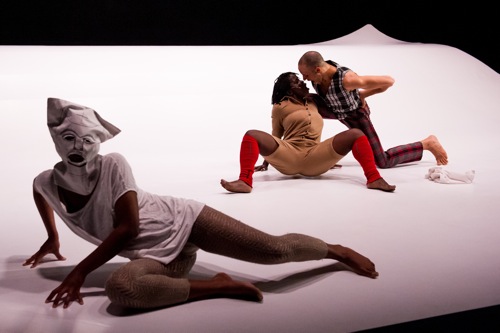
Alain Bouffard’s Baron Samedi. Masked: Dorothée Munyaneza. Behind her: Nadia Beugré and Will Rawls. Photo: Ian Douglas
The performers are all mic’d, which gives the raunchy proceedings a disquieting (if perhaps appropriate) mysteriousness; when a voice suddenly rings out, it can take a while to figure out who’s actually doing the singing or the talking. But the amplification also permits quiet conversations like two that Thomson and Rawls have in English at the edge of the platform, with the former insinuating and demanding, and the latter embarrassed and cringing. So you can’t pay what you owe me, eh? Is the gist of the first. And “I have something for you in this room” guides the second. The end result is a forcible, degrading, half-seen sexual act. At his next appearance, Rawls is crawling on hands and knees, a dingy piece of fabric covering his entire head.
Everyone is busy or resting in sight almost all the time. When Thomson sings “Pirate Jenny,” the others scrub the floor; by the end of the song, Beugré is rubbing up his legs, while Normand takes the opportunity to close in behind Beugré and stroke her butt. When Muyaneza, wearing the hat, and lounging on the hill, begins to sing of the gluttonous Jakob Schmidt, Normand nuzzles the sole of her foot as if it were a hunk of meat. People tangle—amorously or viciously; images of death or helplessness crystallize out of actions that seemed harmless. Musicians Martel and/or Murcia move at times onto the white area, confront the performers, or join in a chorus.
A few times, performers recount fragmentary stories of their own lives; emigration from countries in turmoil becomes a sub-theme. Thomson tells (brilliantly) the story of a different character—one who lived through life in a child army, in a refugee camp, and now both gratefully and sardonically celebrates ageing in America. Always the cast members watch one another. Someone could creep up behind you and steal your life.
Once, they collaborate in a nasty charade. Normand enters and dispenses signs that are to be hung around each performer’s neck. Each announces (in French) a role. Beugré is identified as “PIMP,” Thomson as “JUDGE.” Rawls, entering creakily in a sleazy lavender dress, his face half hidden by that piece of cloth, is given the placard that labels him as “PROSTITUTE.” The bidding starts for Rawls and goes wackily high. The way Beugré handles the merchandise to show her/his charms brings a slave market to mind.
One of the most arresting sequences from a dance point of view is a solo that Thomson embarks on near the end of Baron Samedi. The others watch him as if he might be a dangerous beast. If he needs help, they’re not sure how to give it. But they do, as a group, pick him up when he collapses and haul him to the top of the “hill.” A few moments later, he dances again, more terribly than before. Omigod, how he dances! What is he? A man crumbling from debauchery? A creature of some sort? An insane dictator? A shaman possessed by a furious spirit? He lurches and stumbles and gesticulates, spraddled-legged, his knees wobbling. They pick him up again and run with him up and down the slanted mount. The last sound we hear, after Rawls has sung another Brecht-Weil song, is Thomson’s laugh in the final darkness.
This place with its slippery slope is indeed like the tawdry, anything-goes city that Brecht and Weill created in The Rise and Fall of Mahoganny, and, by extension, like all corrupt kingdoms where the strong and the rich prey on the weak and poor.

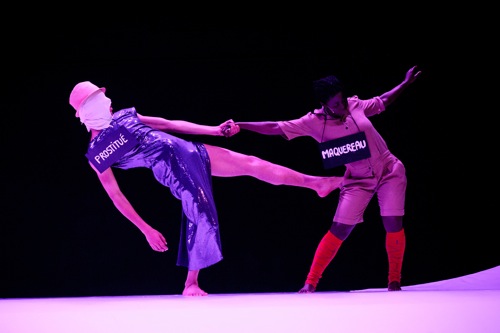
Thanx ever so much for your view & review! You are right on here – I saw the première in France. You are forever perspicacious and so full of love for the Dance, dancers, choreographers…. I came upon this following threads on the internet this morning here in Paris…and I want to TBT thank you also for you fabulously magnificent tribute to Eleanor King….on page http://www.ccdr.org/king_bio.html. Bravo to you!!
The show came out here after its NYC run, and your image about nightmare is dead on — very spooky stuff.